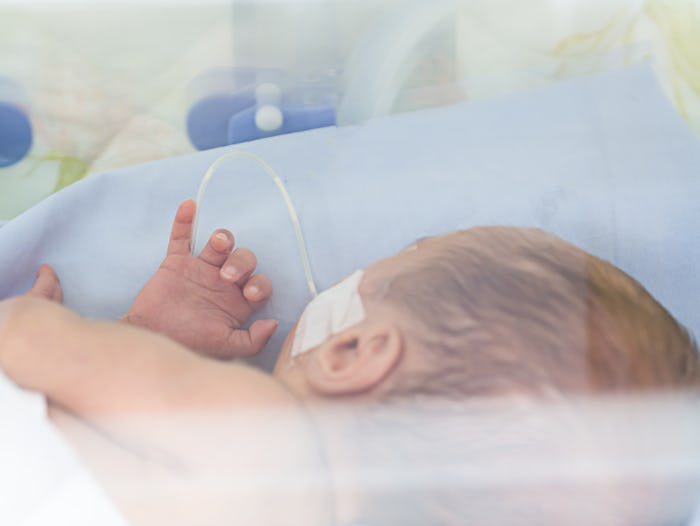Life

Here's How Long Preemie Babies Stay In The Hospital, According To Experts
It's every expectant mother's hope to carry her baby to term and have a less-than-eventful delivery. Not all pregnancies end according to plan, though. Babies born before the 37th week of gestation are considered premature (preemies), and run a greater risk of infection and other complications. If you deliver at, or before 37 weeks, your baby will likely be transported to the neonatal intensive care unit (NICU) of the hospital. So, how long do preemie babies stay in the hospital? This largely depends on how early they entered the world, how developed they are, and how many complications they're facing.
One of the biggest issues preemies experience is having underdeveloped lungs. Their digestive systems and immune systems might also need more time to fully develop. L’il Aussie Prems Foundation cites that a preemie born around 36 weeks could be in the hospital, on average, for 11 days. The same foundation cites that baby born as early as 23 weeks might be in the NICU for upwards of (approximately) 163 days. In the end, though, the amount of time a premature baby stays in the NICU depends on the specific needs of the baby and how long it will take for those needs to be met in order fro the baby to thrive outside the hospital.
Dr. Natalia Henner, a neonatologist at Ann & Robert H. Lurie Children's Hospital of Chicago, tells the Chicago Tribune "when he or she learns how to stay warm, does not need any breathing machines, and is eating by mouth," the baby is probably safe to leave the NICU. That means there isn't one specific, "cure all" time spent in the NICU that applies to all.
In order for your preemie to be discharged, Kids Health says there are three main criteria the NICU staff will evaluate first. The dedicated doctors and nurses will want to know if your baby can maintain their body temperature in an open crib for at least 24-48 hours, take feedings (whether it's bottle or breast) without supplemental tube feedings, and if they are gaining weight. If your baby experienced difficulty in any of these areas, the hospital may choose to keep them there longer.
Some issues preemies face once they're home, according to NICU-PEDIA, are infection, breathing and feeding issues, and sleep apnea. It's important to know what to expect once your baby is discharged, and how you can be proactive in managing your preemie's medical issues before you leave the hospital.
Whether your baby is in the hospital for a few extra days, a few extra weeks, or even a few months, there are steps you can take to aid in their continued development — at least, from an emotional point-of-view. Be an active participant in caring for your preemie. When you're able, talk to them, touch them often, and most of all, revel in the fact that despite a few setbacks, your baby is here. They're here, with you.